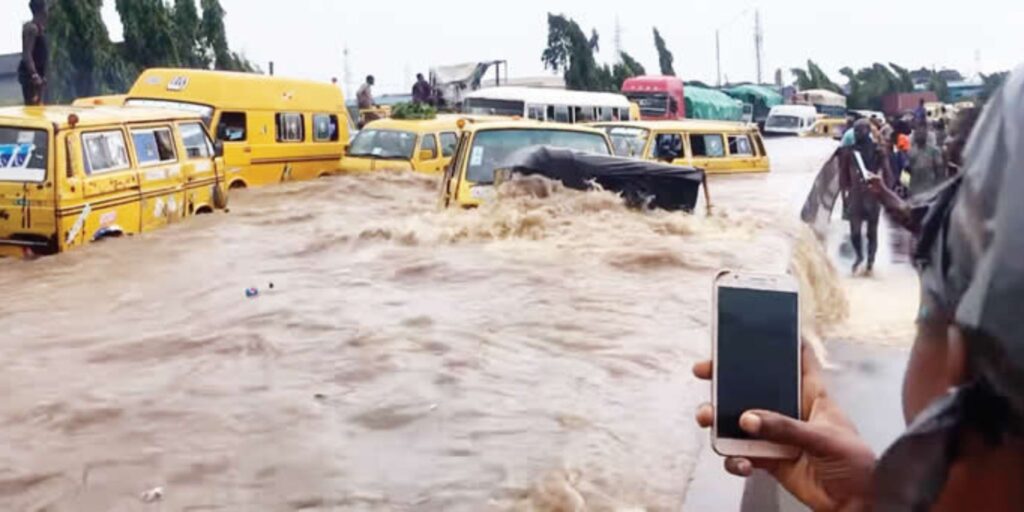
Flooding: Lagos Govt Warns Lekki, Ikorodu, Ajegunle Residents To Relocate
The Lagos State Government has issued a renewed alert to residents in low-lying areas of Lekki, Ikorodu, and Ajegunle, urging them to relocate to higher ground to avoid the dangers of flooding.
Speaking on Channels Television’s Politics Today on Tuesday, Commissioner for Environment and Water Resources, Tokunbo Wahab, emphasized the urgency:
“Those around the Ajilete axis of Lagos—that’s Ajegunle—have to move. Those near the coastline of Ikorodu, like Majidu, must relocate. Some parts of the Lekki corridor too, not all.”
He reassured that areas like Epe, Mushin, and Ikeja remain safe, but warned residents of Isheri in the OPIC zone to stay vigilant.
Wahab explained that Lagos, being a coastal city, is vulnerable to climate change and will experience flash flooding this year. According to forecasts from the Nigerian Meteorological Agency (NiMet), rainfall levels are expected to surpass last year’s.
“For those who stay in the lowlands of Lagos, they have to move to the uplands pending when the rain recedes,” he advised.
On Monday, several communities across Lagos were submerged following relentless rainfall that began Sunday night and continued into the next evening. Viral videos captured flooded streets, submerged vehicles, and disrupted commercial activity across the state.
Despite the chaos, Wahab called for calm, assuring residents that the government is actively clearing drainage systems and expanding flood channels to reduce the impact.
“We won’t tell Lagosians lies. Lagos will be exposed to the vagaries of climate change… but we must build resilient infrastructure and encourage responsible behavior,” he said.
“If nature takes its course, our role is to mitigate its impact.”
In the wake of devastating floods that have claimed hundreds of lives and displaced thousands across Nigeria this year, the Federal Government has issued a fresh warning of imminent flooding in 19 states and 76 locations due to heavy rainfall expected from August 5 to August 9, 2025.
The alert, released by the National Flood Early Warning Systems Centre under the Federal Ministry of Environment, urges residents and local authorities to take urgent precautionary measures to safeguard lives and property.
States expected to be affected include: Akwa Ibom (Edor, Eket, Ikom, Oron, Upenekang), Bauchi, Ebonyi, Cross River, Nasarawa, Benue, Kaduna, Katsina, Kebbi, Kano, Niger, Plateau, Taraba, Jigawa, Yobe, Zamfara, Sokoto, Borno, and Gombe.
This warning follows a series of deadly floods in recent months: In May 2025, torrential rains and a dam collapse in Mokwa, Niger State, killed at least 200 people and displaced thousands In June, flash floods in Ogun and Gombe states left dozens dead, with submerged roads and homes forcing evacuations.
In 2024, over 1.2 million Nigerians were affected by floods, with hundreds of deaths and widespread destruction of homes, farmlands, and infrastructure.
The collapse of the Alau Dam in Borno last September submerged 70 per cent of surrounding communities and displaced over 419,000 residents, underscoring the scale of Nigeria’s flood crisis.
Experts warn that climate change, poor urban planning, and blocked drainage systems are intensifying the frequency and severity of floods.
Nigeria’s rainy season, which spans April to October, has become increasingly unpredictable and dangerous. “Flooding has become an annual event… but there has not been much political power to implement change,” said Ugonna Nkwunonwo, a flood risk analyst at the University of Nigeria.
The Federal Government has called on states, emergency responders, and local governments to:
Clear drainage systems, Monitor water levels, Relocate residents in flood-prone zones, Strengthen disaster response efforts.
Emergency relief funds have been approved, and agencies like NEMA are actively deploying resources to mitigate the impact.
- Adeleke Invites APC To Davido’s Wedding In US
- Doyin Abiola, Journalism Icon, MKO’s Wife, Dies at 82
- Asa Asika Described Davido As Nigeria’s Most Influential Figure
Share your story or advertise with us: Whatsapp: +2348033202396 Email: sentinelnewsng@gmail.com








